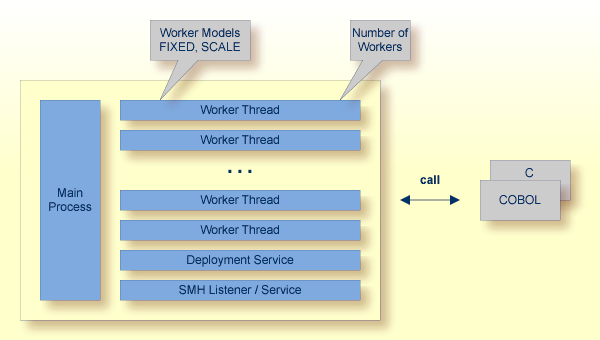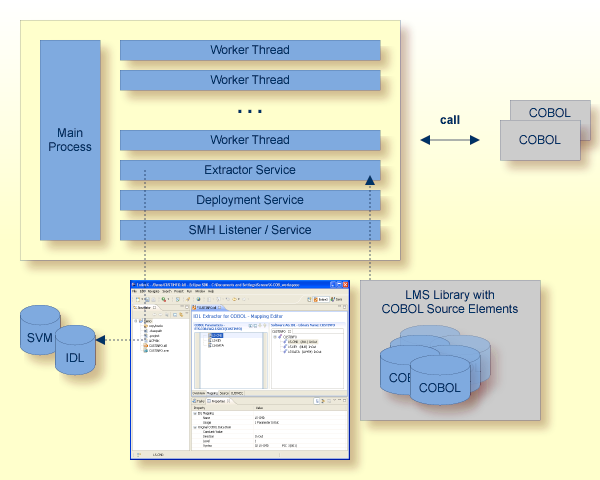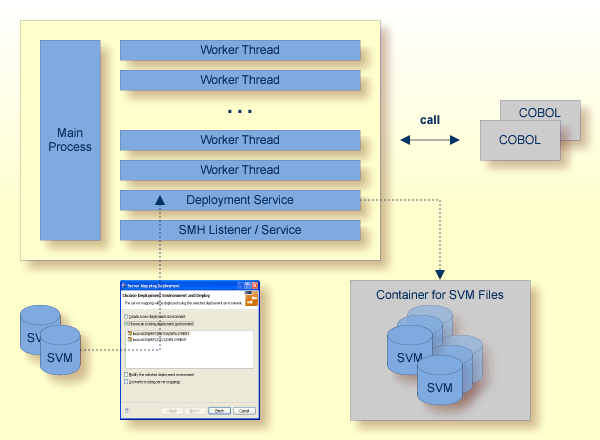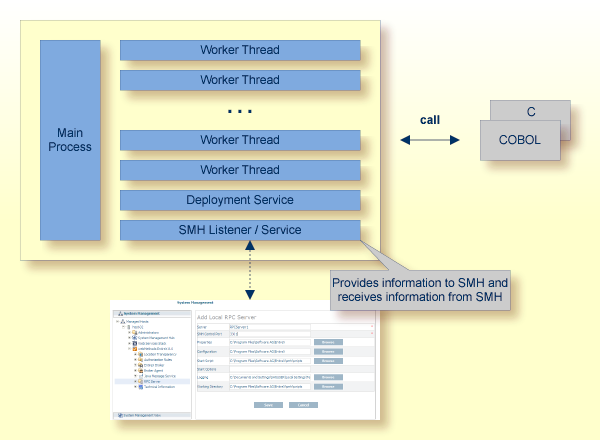The EntireX BS2000/OSD Batch RPC Server allows standard RPC clients to communicate with RPC servers on the operating system BS2000/OSD. It supports the programming languages COBOL and C.
This document covers the following topics:
This section covers the following topics:

RPC requests are worked off inside the RPC server in worker threads, which are controlled by a main thread. Every RPC request occupies during its processing a worker thread. If you are using RPC conversations, each RPC conversation requires its own thread during the lifetime of the conversation. The BS2000/OSD Batch RPC Server provides two worker models:
FIXED
The fixed model creates a fixed number of worker threads.
The number of worker threads does not increase or decrease during the lifetime of an RPC server instance.
SCALE
The scale model creates worker threads depending on the incoming load of RPC requests.
A maximum number (thru value of the workermodel parameter)
of worker threads created can be set to restrict the system load.
The minimum number (from value of the workermodel parameter),
allows you to define a certain number of threads - not used by the currently executing RPC request -
to wait for new RPC client requests to process.
In this way the RPC server is ready to handle many RPC client requests arriving at the same time.
BS2000/OSD Batch RPC Server provides the following services for ease-of-use:
The Extractor Service is a prerequisite for remote extractions with the IDL Extractor for COBOL and IDL Extractor for PL/I. See Extractor Service under BS2000/OSD for more information.

The Deployment Service allows you to deploy server mapping files (SVM files) interactively using the Deployment Wizard (see Server Mapping Deployment). On the RPC server side, the SVM files are stored in an ISAM file as the container. See Deploment Service under BS2000/OSD for configuration information.

With the SMH Listener Service you use the System Management Hub to monitor the RPC server. See Administering the EntireX RPC Servers using System Management Hub under UNIX | Windows.
The SMH Service is switched on if the parameter smhport is set. See parameter smhport under Configuring the RPC Server.

The BS2000/OSD Batch RPC Server is optimized to call COBOL servers originally written for Fujitsu Siemens. For this purpose, the RPC server requires in many situations a server mapping file (SVM).
SVM files contain COBOL-specific mapping information that is not included in the IDL file and therefore not sent by an EntireX RPC client to the RPC server. See also When is an SVM File Required? under Handling SVM Files.

The RPC server marshalls the data in a two-step process: the RPC request coming from the RPC client (Step 1) is completed with COBOL-specific mapping information taken from the SVM file (Step 2). In this way the COBOL server can be called as expected.
The SVM files are retrieved as a result of the IDL Extractor for COBOL extraction process and the COBOL Wrapper if a COBOL server is generated.
Note:
SVM files are used for COBOL only.
![]() To call an existing COBOL server
To call an existing COBOL server
Use the IDL Extractor for COBOL to extract the Software AG IDL and, depending on the complexity of the extraction, also an SVM file.
Build an EntireX RPC client using any EntireX wrapper. See EntireX Wrappers. For a quick test you can:
use the IDL Tester; see EntireX IDL Tester in the EntireX Workbench documentation
generate an XML mapping file (XMM) and use the XML Tester for verification; see EntireX XML Tester
See Client and Server Examples for BS2000/OSD in the COBOL Wrapper documentation for COBOL RPC Server examples.
![]() To write a new COBOL server
To write a new COBOL server
Use the COBOL Wrapper to generate a COBOL server skeleton and, depending on the complexity of the extraction, also an SVM file. Write your COBOL server and proceed as described under Using the COBOL Wrapper for the Server Side.
Build an EntireX RPC client using any EntireX wrapper. See EntireX Wrappers. For a quick test you can:
use the IDL Tester; see EntireX IDL Tester in the EntireX Workbench documentation
generate an XML mapping file (XMM) and use the XML Tester for verification; see EntireX XML Tester
See Client and Server Examples for BS2000/OSD in the COBOL Wrapper documentation for COBOL RPC Server examples.
![]() To write a new C server
To write a new C server
Use the C Wrapper to generate a C server skeleton and a C server interface object. Write your C server and proceed as described under Using the C Wrapper for the Server Side (z/OS, UNIX, Windows, BS2000/OSD, IBM i).
Build an EntireX RPC client using any EntireX wrapper. See EntireX Wrappers. For a quick test you can:
use the IDL Tester; see EntireX IDL Tester in the EntireX Workbench documentation
generate an XML mapping file (XMM) and use the XML Tester for verification; see EntireX XML Tester